★★
“Explanations? They’re vastly over-rated.”
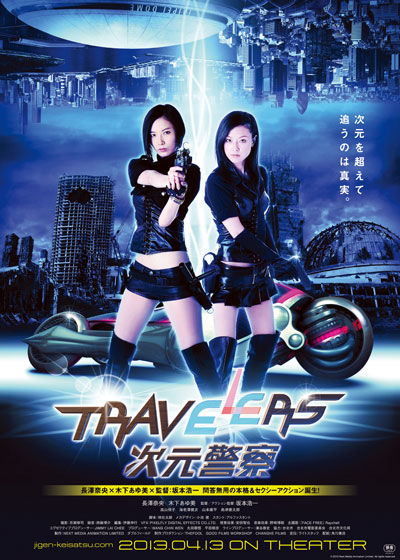 This doesn’t so much hit the ground running, as plummet into it at top speed, to such an extent I genuinely stopped the film, to check if this was perhaps part two of an ongoing series. It isn’t: it’s just that unconcerned about explanations. What seems to be going on, is a universe where the different dimensions are now connected. Hence, there’s Retro World, Fairy World, Lost World, etc. This offers new criminal possibilities; to counter these, a trans-dimensional police force is also created. One such officer is Ai (Nagasawa), but her mission, to protect a psychic (Takayama) against the terrorist group Doubt is thrown into… Well, doubt after she meets her former partner Yui (Kinoshita), who appears to have thrown her lot in on the side of the villains.
This doesn’t so much hit the ground running, as plummet into it at top speed, to such an extent I genuinely stopped the film, to check if this was perhaps part two of an ongoing series. It isn’t: it’s just that unconcerned about explanations. What seems to be going on, is a universe where the different dimensions are now connected. Hence, there’s Retro World, Fairy World, Lost World, etc. This offers new criminal possibilities; to counter these, a trans-dimensional police force is also created. One such officer is Ai (Nagasawa), but her mission, to protect a psychic (Takayama) against the terrorist group Doubt is thrown into… Well, doubt after she meets her former partner Yui (Kinoshita), who appears to have thrown her lot in on the side of the villains.
At least, I think some of the above is probably fairly accurate. I am not prepared to commit any more strongly than that. Easily the best thing this has to offer are the actual fight: Sakamoto did a lot of work on Power Rangers, and also the cult classic Mark Dacascos vehicle, featuring a young Britney Murphy, and the style here is fast and frenetic, with people being punched hard enough to fly into things. A lot. Credit both lead actresses for doing a good chunk of this themselves. Less successful, are just about all the other elements, led by the confusing plot, that appears to think whizzy SFX will remove any need for coherence. Admittedly, it’s not helped by subs, even the official DVD English ones, which are borderline illiterate, and on at least one occasion appear to contradict directly the on-screen action.
I was also more than a little uncomfortable with the apparently leering approach taken to the heroines. Chris, breezing through the living room, airily dismissed it with a roll of her eyes as “Oriental women in shorts,” (see the cover on the right for a good example). While part of me wanted to argue the point, the cheesecake quotient here was just too high for any credible defense: I mean, do you really need skimpy clothes for inter-dimensional travel? The final battle is kinda decent, but I’ll confess, my brain had largely given up on the entire exercise by that point, my attention only being somewhat regained whenever things e.g. fists or actresses started to fly. Sakamoto’s credentials as a fight choreographer are fine, just not in the director’s chair.
Dir: Koichi Sakamoto
Star: Nao Nagasawa, Ayumi Kinoshita, Yuko Takayama, Kenji Ebisawa





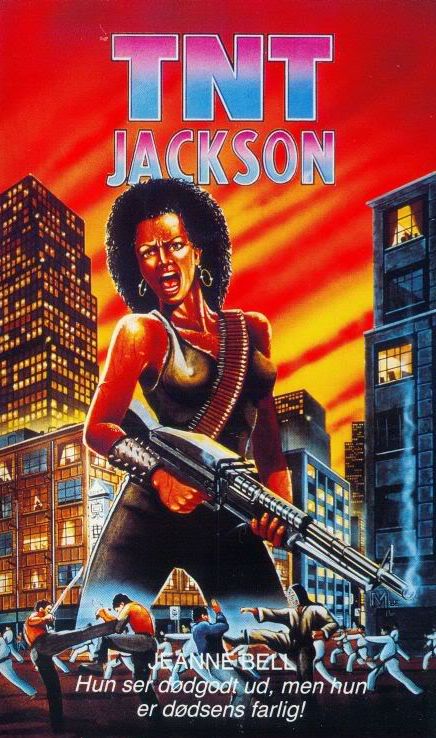
 Recent high-school graduate Cassie (Cobb) works at a bank alongside her mother (Quinlan), bickering about the usual things, such as whether to go to college or not. This mundance existence is suddenly interrupted by a robbery: Cassie is stunned to realize the raiders are actually some of her school friends. When they realize this, the girls are forced to take her along, and she discovers the cause of the crime – the father of one (Thomson) has been kidnapped while on business in Mexico. Meanwhile, Mom is tracking down her kidnapped daughter, FBI agent Mendoza (Blasi) is also on the hunt, and one of the girl gang has her own plans for the ill-gotten gains, which doesn’t involve any ransom.
Recent high-school graduate Cassie (Cobb) works at a bank alongside her mother (Quinlan), bickering about the usual things, such as whether to go to college or not. This mundance existence is suddenly interrupted by a robbery: Cassie is stunned to realize the raiders are actually some of her school friends. When they realize this, the girls are forced to take her along, and she discovers the cause of the crime – the father of one (Thomson) has been kidnapped while on business in Mexico. Meanwhile, Mom is tracking down her kidnapped daughter, FBI agent Mendoza (Blasi) is also on the hunt, and one of the girl gang has her own plans for the ill-gotten gains, which doesn’t involve any ransom. In the near-future, Japan is plagued by “engineers” – criminals who have voluntarily undergone genetic modifications, which not only mutate their bodies in bizarre ways, but give them near superpowers and the ability to sprout weapons from their wounds. To combat this, the privatized Japanese police force under their chief (Benny) has an absolutely no-holds barred policy of shoot first, ask questions… Well, don’t bother asking questions. Their top “engineer hunter” is Ruka (Shiina, whom you may recognize from Audition), the daughter of a police officer who was killed in the line of duty while she was just a young girl. She is tracking down the scientist behind the engineers, known as “Key Man” (Itao) because of the key-shaped tumours which trigger the mutations. But when they meet, he infects her – and also reveals the truth behind the deaths of both their fathers.
In the near-future, Japan is plagued by “engineers” – criminals who have voluntarily undergone genetic modifications, which not only mutate their bodies in bizarre ways, but give them near superpowers and the ability to sprout weapons from their wounds. To combat this, the privatized Japanese police force under their chief (Benny) has an absolutely no-holds barred policy of shoot first, ask questions… Well, don’t bother asking questions. Their top “engineer hunter” is Ruka (Shiina, whom you may recognize from Audition), the daughter of a police officer who was killed in the line of duty while she was just a young girl. She is tracking down the scientist behind the engineers, known as “Key Man” (Itao) because of the key-shaped tumours which trigger the mutations. But when they meet, he infects her – and also reveals the truth behind the deaths of both their fathers.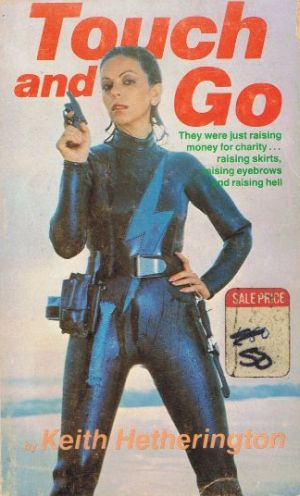 This 1980 film was originally called Friday the Thirteenth, but went through a title change in production, after they discovered some other film with that title being made… No hockey-masks to be seen here: instead, it’s the story of three young women, Eva (Hughes), Fiona (Contouri) and Millicent (Duncan), who start robbing places, largely for amusement – they donate the proceedings to an orphanage. However, after one of their victims ends up making far more money than they do, thanks to a bogus insurance claim, they switch targets and set their sights on a bigger fish, in the shape of a luxury hotel which contains a bank, jewellery store and other treats. This requires expanding their team, but with larger hauls come larger risks, as they find out, even once the actual crime has been carried out.
This 1980 film was originally called Friday the Thirteenth, but went through a title change in production, after they discovered some other film with that title being made… No hockey-masks to be seen here: instead, it’s the story of three young women, Eva (Hughes), Fiona (Contouri) and Millicent (Duncan), who start robbing places, largely for amusement – they donate the proceedings to an orphanage. However, after one of their victims ends up making far more money than they do, thanks to a bogus insurance claim, they switch targets and set their sights on a bigger fish, in the shape of a luxury hotel which contains a bank, jewellery store and other treats. This requires expanding their team, but with larger hauls come larger risks, as they find out, even once the actual crime has been carried out.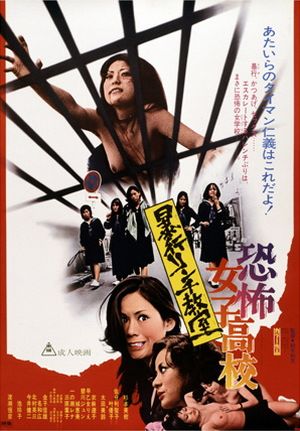
 This was the title that finally ‘broke’ Chris, and she wondered what the hell I was Googling to come across this movie. Shame she missed it, as despite some rather nasty sexual sadism, it’s among the best of the genre. Girl gang leader Noriko (Sugimoto) is assigned to the “School of Hope”, a morally-bankrupt educational establishment for delinquent girls. It’s principal is entirely ineffectual, and it’s actually run by the vice-principal (Imai), with the collaboration of the “Disciplinary Committee,” a group of the girls he allows to dish out punishment. Noriko isn’t going to stand for that, and teams up with a sleazy journalist (Watase) to bring down both the Committee and those in charge.
This was the title that finally ‘broke’ Chris, and she wondered what the hell I was Googling to come across this movie. Shame she missed it, as despite some rather nasty sexual sadism, it’s among the best of the genre. Girl gang leader Noriko (Sugimoto) is assigned to the “School of Hope”, a morally-bankrupt educational establishment for delinquent girls. It’s principal is entirely ineffectual, and it’s actually run by the vice-principal (Imai), with the collaboration of the “Disciplinary Committee,” a group of the girls he allows to dish out punishment. Noriko isn’t going to stand for that, and teams up with a sleazy journalist (Watase) to bring down both the Committee and those in charge.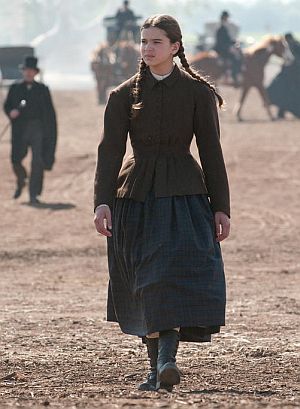 Based on the original source material – which was very much focused on John Wayne – and the trailers, you’d be forgiven for thinking of this as just another macho Western. However, I read some pieces which suggested that wasn’t the case, with the story [as in the original novel] told from the viewpoint of teenage girl Mattie Ross (Steinfeld), who hires drunken Marshal Rooster Cogburn (Bridges) to hunt down the outlaw (Brolin), who killed her father. That is indeed the case – despite Steinfeld getting an Oscar nomination for Best Supporting Actress, while Bridges was listed for Best Actor. Go figure.
Based on the original source material – which was very much focused on John Wayne – and the trailers, you’d be forgiven for thinking of this as just another macho Western. However, I read some pieces which suggested that wasn’t the case, with the story [as in the original novel] told from the viewpoint of teenage girl Mattie Ross (Steinfeld), who hires drunken Marshal Rooster Cogburn (Bridges) to hunt down the outlaw (Brolin), who killed her father. That is indeed the case – despite Steinfeld getting an Oscar nomination for Best Supporting Actress, while Bridges was listed for Best Actor. Go figure.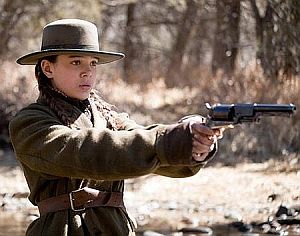 That said, there’s something refreshing about the way this is…well,
That said, there’s something refreshing about the way this is…well, 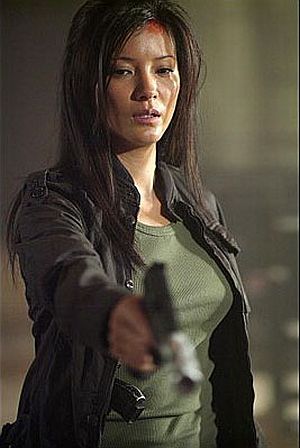 Every seven years, thirty of the world’s greatest assassins gather together for a battle. The winner gets $10 million, while bettors view the action remotely and gamble on the duels, face-offs and bloodbaths which ensue. Each assassin has a tracker implanted, and has a scanner where they can see the location of any other contestants nearby. This time, it’s in Middlesbrough, England, with reigning champion Joshua Harlow (Rhames) returning after he it told the murderer of his wife will be taking part. One of the 30 dumps their tracker into an alcoholic priest (Carlyle), who is “surprised”, shall we say, to become the target for the other 29. Lai Lai Zhen (Hu) realizes he’s an innocent, and vows to protect him, while also trying to win the competition.
Every seven years, thirty of the world’s greatest assassins gather together for a battle. The winner gets $10 million, while bettors view the action remotely and gamble on the duels, face-offs and bloodbaths which ensue. Each assassin has a tracker implanted, and has a scanner where they can see the location of any other contestants nearby. This time, it’s in Middlesbrough, England, with reigning champion Joshua Harlow (Rhames) returning after he it told the murderer of his wife will be taking part. One of the 30 dumps their tracker into an alcoholic priest (Carlyle), who is “surprised”, shall we say, to become the target for the other 29. Lai Lai Zhen (Hu) realizes he’s an innocent, and vows to protect him, while also trying to win the competition.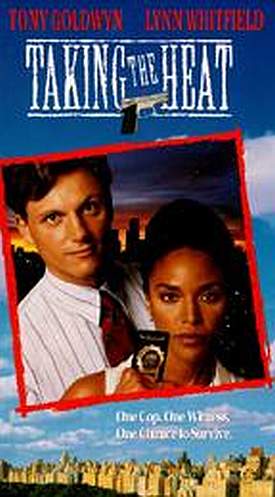 Michael Norell (Goldwyn) sees mob boss Tommy Canard (Arkin) whacking a debtor, but won’t admit it to the cops. However, when they look at the credit-card transactions, the truth comes out and Detective Hunter (Whitfield) is sent to retrieve the witness; Canard, thanks to a mole, also finds out and send his top hitman to ensure Norell never reaches the courthouse. A heatwave has simultaneously hit New York, leading to blackouts, gridlock and a breakdown in communications, so it’s down to Detective Hunter, back on her old stomping ground, to negotiate her way through the traffic jams and dodge the killers out to get Norell.
Michael Norell (Goldwyn) sees mob boss Tommy Canard (Arkin) whacking a debtor, but won’t admit it to the cops. However, when they look at the credit-card transactions, the truth comes out and Detective Hunter (Whitfield) is sent to retrieve the witness; Canard, thanks to a mole, also finds out and send his top hitman to ensure Norell never reaches the courthouse. A heatwave has simultaneously hit New York, leading to blackouts, gridlock and a breakdown in communications, so it’s down to Detective Hunter, back on her old stomping ground, to negotiate her way through the traffic jams and dodge the killers out to get Norell.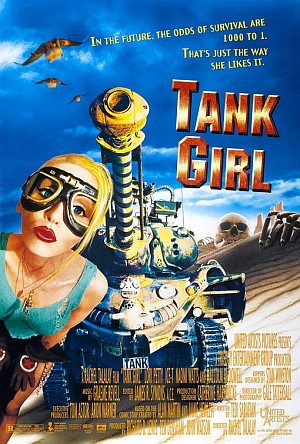 The creators of the Tank Girl comic once said: “It’d be cool if a bunch of tinseltown producers could get hold of her, totally misunderstand what they’re dealing with, ignore our advice, and bring out a movie that would bomb, alienate our fan-base, destroy the comic, and bankrupt the pair of us in the process.” Mission accomplished. I never really liked the original comic, but the anarchic appeal of a minor cult classic is almost entirely removed, in favor of a lead character who never gets beyond irritating. The setting is the same: a post-apocalyptic wasteland where water is almost entirely under the control of the evil Water & Power, headed by Malcolm McDowell. When his minions destroy the compound where ‘Becca (Petty) and her pals live, she is enslaved, but escapes with the help of Jet Girl (the then-unknown Watts) and teams up with the shadowy, feared Rippers to take on W&P.
The creators of the Tank Girl comic once said: “It’d be cool if a bunch of tinseltown producers could get hold of her, totally misunderstand what they’re dealing with, ignore our advice, and bring out a movie that would bomb, alienate our fan-base, destroy the comic, and bankrupt the pair of us in the process.” Mission accomplished. I never really liked the original comic, but the anarchic appeal of a minor cult classic is almost entirely removed, in favor of a lead character who never gets beyond irritating. The setting is the same: a post-apocalyptic wasteland where water is almost entirely under the control of the evil Water & Power, headed by Malcolm McDowell. When his minions destroy the compound where ‘Becca (Petty) and her pals live, she is enslaved, but escapes with the help of Jet Girl (the then-unknown Watts) and teams up with the shadowy, feared Rippers to take on W&P.